Landscape Gardening in Queens Park
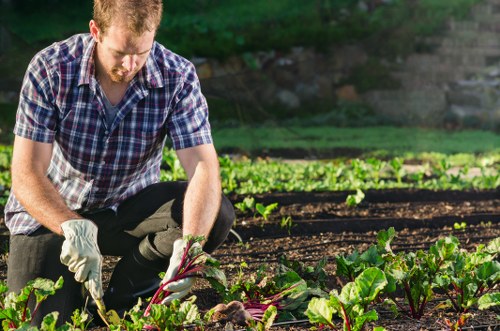
Queens Park is renowned for its lush greenery and vibrant gardens, making it an ideal location for landscape gardening. Whether you're a seasoned gardener or a novice looking to enhance your outdoor space, landscape gardening in Queens Park offers endless possibilities to create a beautiful and functional environment.
In this comprehensive guide, we'll explore the various aspects of landscape gardening, including planning, plant selection, sustainable practices, and maintenance tips tailored specifically for the unique climate and soil conditions of Queens Park.
By understanding the fundamentals and embracing creative design elements, you can transform your garden into a stunning oasis that reflects your personal style and meets your practical needs.
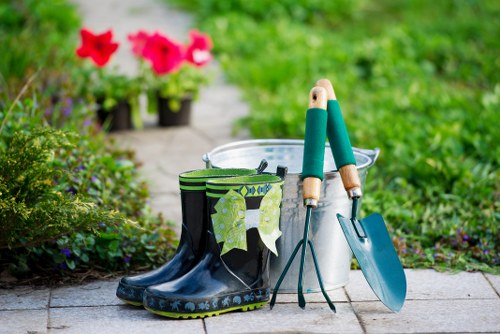
Benefits of Landscape Gardening
Investing time and effort into landscape gardening brings a multitude of benefits that extend beyond aesthetic appeal. Here are some key advantages:
- Enhancing Curb Appeal: A well-designed garden can significantly boost the visual appeal of your property, making a lasting impression on visitors and potential buyers.
- Environmental Benefits: Gardens contribute to a healthier environment by improving air quality, reducing carbon footprints, and supporting local wildlife.
- Health and Well-being: Spending time in a beautifully landscaped garden can reduce stress, promote relaxation, and encourage physical activity through gardening tasks.
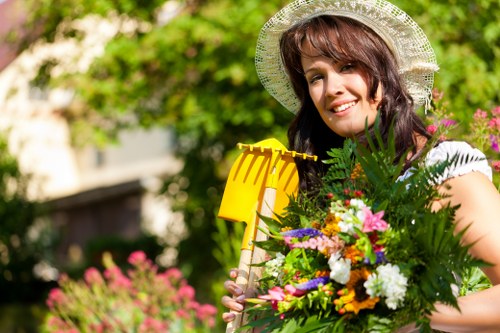
Planning Your Landscape Garden
Assessing Your Space
Before diving into the design process, it's essential to assess the available space. Consider the size, shape, and existing features of your garden. Take note of sunlight patterns, soil quality, drainage, and any structural elements like trees or patios that you plan to incorporate.
Choosing the Right Plants
Selecting plants that thrive in Queens Park's climate is crucial for a sustainable garden. Opt for native species that are well-adapted to the local conditions, requiring less maintenance and water. Diversifying plant selection with a mix of perennials, shrubs, and trees can create a balanced and resilient garden ecosystem.
Designing for Seasons
A successful landscape garden should provide visual interest throughout the year. Plan for seasonal changes by incorporating plants that bloom in different seasons, ensuring your garden remains vibrant and engaging across all months.
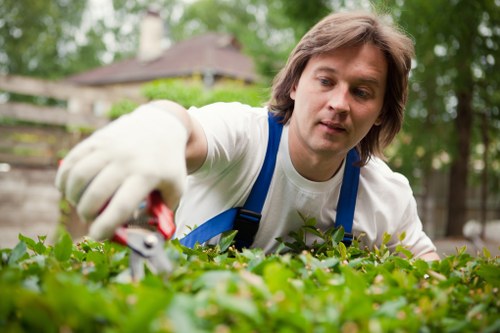
Essential Elements of Landscape Gardening
Hardscaping Features
Hardscaping refers to the non-living elements of your garden, such as pathways, patios, fences, and walls. These features provide structure and functionality, guiding movement and defining spaces within your garden.
Materials and Styles
Choose materials that complement the overall aesthetic of your garden. Popular options include natural stone, brick, wood, and concrete. The style of hardscaping should align with your personal taste, whether it's modern, rustic, or traditional.
Softscaping Elements
Softscaping encompasses the living components of your garden, including plants, flowers, and lawn areas. Thoughtful softscaping enhances the beauty and diversity of your outdoor space.
Plant Selection and Arrangement
Arrange plants in layers, combining tall trees with medium-sized shrubs and low groundcovers to create depth and texture. This approach not only looks aesthetically pleasing but also supports various wildlife species.
Water Features and Lighting
Incorporating water features like fountains, ponds, or waterfalls can introduce soothing sounds and visual interest to your garden. Additionally, strategic lighting enhances the ambiance and ensures safety during evening hours.
Choosing the Right Lighting
Select lighting that highlights key features of your garden, such as pathways, statues, or flowering plants. Solar-powered lights are an eco-friendly option that reduces energy consumption.
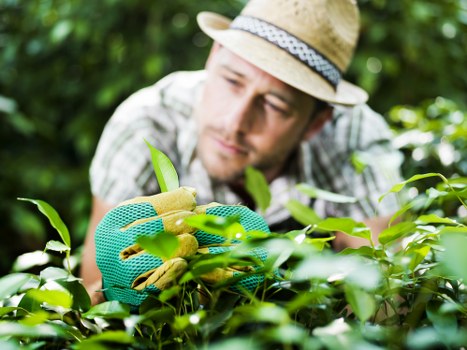
Best Plants for Queens Park Gardens
Perennials
Perennials are a staple in any landscape garden due to their ability to return year after year. Some excellent choices for Queens Park include:
- Lavender: Known for its fragrance and purple blooms, lavender attracts pollinators and repels pests.
- Hostas: Ideal for shady areas, hostas offer a variety of foliage colors and textures.
- Daylilies: These hardy plants produce vibrant flowers and require minimal maintenance.
Shrubs and Trees
Shrubs and trees provide structure, shade, and habitat for wildlife. Consider planting:
- Hydrangeas: Blooming in the summer, hydrangeas add lushness and color to your garden.
- Japanese Maple: With its striking foliage and graceful form, the Japanese Maple serves as a stunning focal point.
- Boxwood: A versatile evergreen, boxwood is perfect for creating hedges or topiary shapes.
Annuals and Bulbs
Annuals and bulbs provide seasonal splashes of color and can be easily swapped to keep your garden dynamic.
- Tulips: These spring bulbs offer a wide range of colors and are relatively easy to grow.
- Marigolds: Bright and cheerful, marigolds are excellent for adding color to borders and containers.
- Petunias: Available in various hues, petunias are perfect for adding vibrancy to beds and hanging baskets.

Sustainable Gardening Practices
Water Conservation
Conserving water is essential, especially in regions prone to drought. Implementing efficient irrigation systems, such as drip irrigation, and using mulch can significantly reduce water usage.
Soil Health
Healthy soil is the foundation of a thriving garden. Regularly amend your soil with organic matter like compost to enhance its structure, fertility, and moisture-retention capabilities.
Organic Gardening
Adopting organic gardening practices minimizes the use of harmful chemicals, promoting a healthier ecosystem. Use natural pest control methods and choose organic fertilizers to maintain soil and plant health.

Hiring a Landscape Gardener in Queens Park
What to Look for
When selecting a landscape gardener, consider their experience, portfolio, and client reviews. A professional with local knowledge of Queens Park's climate and soil conditions is invaluable.
Benefits of Professional Services
Hiring a professional landscape gardener ensures that your garden is designed and maintained to the highest standards. They bring expertise in plant selection, design principles, and sustainable practices, saving you time and effort.

Maintaining Your Landscape Garden
Seasonal Maintenance Tips
Regular maintenance is key to keeping your garden healthy and beautiful throughout the year. Here are some seasonal tips:
- Spring: Focus on planting new flowers, pruning dead branches, and preparing the soil for the growing season.
- Summer: Ensure adequate watering, manage weeds, and deadhead spent blooms to encourage more flowers.
- Autumn: Clean up fallen leaves, plant bulbs for spring, and protect sensitive plants from early frost.
- Winter: Prune trees and shrubs, plan next year's garden design, and protect plants from harsh weather conditions.
Pest and Disease Management
Maintaining a healthy garden involves vigilant pest and disease management. Regularly inspect plants for signs of infestation or illness, and address issues promptly using eco-friendly solutions.
Integrated Pest Management (IPM)
IPM is a sustainable approach that combines biological, cultural, and mechanical control methods to manage pests effectively while minimizing environmental impact.

Conclusion
Landscape gardening in Queens Park offers a rewarding way to enhance your outdoor living space, support the environment, and improve your overall well-being. By carefully planning, selecting the right plants, and embracing sustainable practices, you can create a garden that thrives year-round.
Whether you're undertaking the project yourself or enlisting professional help, the key to a successful landscape garden lies in attention to detail and a passion for cultivating beauty. Start your landscape gardening journey today and transform your Queens Park garden into a breathtaking sanctuary.
Contact us today to learn more about our landscape gardening services and take the first step towards your dream garden.


